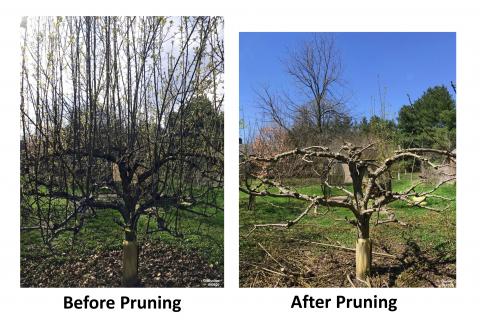5 Expert Tips for Pruning Your Peach Tree Like a Pro
The best time to prune a peach tree is in late winter or early spring, before the buds start to swell. You can identify the dormant buds by their round shape and brown color.
To promote good air circulation and prevent disease, remove any dead, diseased, or damaged branches.
Cut back any crossed or rubbing branches. Also thin out the canopy to allow more light and air to reach the center of the tree. This will also encourage fruit production.
When pruning, make sure to use sharp tools that are clean to avoid spreading diseases. Make sure each cut is at a 45-degree angle about ¼ inch above a bud pointing in the desired direction of growth.
Are you thinking about pruning your peach tree? Or maybe you have a peach tree that needs to be pruned and you’re not sure where to start. Either way, this blog post is for you!
Pruning a peach tree is important for two reasons: to shape the tree and to encourage fruit production. The best time to prune a peach tree is in late winter or early spring, before the buds begin to swell.
When shaping your peach tree, aim for an open center with evenly spaced branches.
This will allow sunlight and air to reach all parts of the tree, which is necessary for healthy growth and fruit production. To encourage fruiting, remove any branches that are growing vertically or at sharp angles. You should also thin out crowded areas of the canopy to improve airflow and reduce competition for resources.
As you prune, be sure to use clean, sharp tools. This will help prevent disease and damage to the plant. And when in doubt, it’s always better to err on the side of caution – so if you’re not sure whether or not to remove a certain branch, it’s probably best to leave it be.
following these tips, you should have no problem giving your peach tree the care it needs!
How and when to prune a peach tree that flowers in spring on old wood.
What Month Should I Prune My Peach Tree?
The best time to prune your peach tree is in the late winter or early spring, before the new growth begins. Peach trees should be pruned every year to encourage new growth and fruit production.
What is the Proper Way to Prune a Peach Tree?
When it comes to pruning a peach tree, there are a few things you need to keep in mind. First, you’ll want to wait until the tree is dormant – this is usually in late winter or early spring. Second, you’ll want to cut back any dead or diseased wood, as well as any crossing or rubbing branches.
Finally, you’ll want to thin out the canopy to allow for better air circulation and more sunlight.
How Do You Prune a Peach Tree for Dummies?
Pruning a peach tree may seem daunting for those who have never done it before, but it’s actually not as difficult as it looks. Here are some simple tips for pruning your peach tree:
1. The first step is to identify the three main types of branches on your peach tree – fruiting, scaffold, and suckers.
Fruiting branches are the ones that produce flowers and fruit, while scaffold branches provide support and structure for the tree. Suckers are fast-growing shoots that come up from the roots or base of the trunk – they should be removed as they won’t produce any fruit.
2. Once you’ve identified the different types of branches, you can start pruning.
For best results, wait until late winter or early spring when the tree is dormant.
3. Start by removing any dead, diseased, or damaged branches first. Then, thin out overcrowded areas of the canopy to allow more light and air circulation.
Finally, cut back any long or wayward branches to keep the overall shape of the tree in check.
4. When cutting back branches, make sure to make clean cuts at a 45-degree angle just above a bud or shoot pointing in the desired direction of growth. Avoid leaving stubs as these can lead to disease problems down the road.
5. With proper care and regular pruning, your peach tree will produce bumper crops of sweet fruits for many years to come!
How Do You Prune a Mature Overgrown Peach Tree?
Pruning a peach tree is important to maintain its shape, encourage fruit production and remove diseased or damaged branches. When pruning a mature overgrown peach tree, you’ll first need to thin out the canopy to allow more sunlight and air circulation to reach the inner branches. Next, cut back any long shoots that are growing vertically.
Finally, shorten or remove any crossing or rubbing branches.

Credit: extension.illinois.edu
Can I Prune a Peach Tree in the Fall
As the weather cools down in autumn, it’s time to start thinking about pruning your peach tree. But can you prune a peach tree in the fall? The answer is yes!
Fall is actually an excellent time to prune most fruit trees, including peaches.
Here are a few tips for fall peach tree pruning:
1. First, take a look at the overall shape of your tree.
You want to maintain a central leader (the main vertical stem) and evenly spaced lateral branches. Remove any dead or damaged branches, as well as any crossing or rubbing branches.
2. Next, focus on thinning out the canopy of your tree.
This will help increase air circulation and sunlight penetration, which can improve fruit production. To thin out the canopy, simply remove some of the smaller branches growing on the perimeter of the tree.
3. Finally, cut back any long or wayward branches by one-third to one-half their length.
This will encourage new growth that will be more compact and productive next season.
How to Prune a Peach Tree in Summer
Summer is the perfect time to prune your peach tree. The hot weather encourages growth, and pruning during this time helps to shape the tree and encourage fruit production. Here are a few tips on how to prune your peach tree in summer:
1. Wait until the tree is fully grown before you start pruning. Peach trees typically take 3-4 years to reach their full size.
2. Prune back any branches that are growing vertically.
These vertical branches produce less fruit than horizontal ones.
3. Cut off any dead or diseased branches. This will help keep your tree healthy and promote new growth.
4. Thin out crowded areas of the tree by removing some of the branches. This will improve air circulation and prevent disease from spreading through the crowded areas.
5. Be careful not to over-prune the tree.
How to Prune a 3 Year Old Peach Tree
Pruning a 3 year old peach tree is not as difficult as it may seem. The first step is to identify the main trunk of the tree. Once you have found the main trunk, you will need to prune away any branches that are growing vertically.
These vertical branches can be pruned back by about one-third their total length. After pruning the vertical branches, you will need to focus on the horizontal branches. When pruning the horizontal branches, you should aim to create an open vase shape.
This will allow for better air circulation and more sunlight to reach the fruit. Finally, you will need to remove any dead or diseased wood from the tree. Dead wood can be identified by its dark color and lack of leaves.
Diseased wood will often have discolored leaves or bark. Once you have removed all of the dead and diseased wood, your tree should be ready for another season of growth!
Pruning Young Peach Trees
Pruning young peach trees is an important step in ensuring a bountiful harvest and healthy tree. When pruning, always remove any dead, diseased, or damaged wood first. Next, thin out the canopy to allow more sunlight and air circulation to reach the fruit.
Finally, cut back any suckers that are growing from the roots or trunk. With proper pruning, your peach tree will be productive for many years to come!
How to Prune an Overgrown Peach Tree
Assuming you would like a blog titled “How to Prune an Overgrown Peach Tree”:
If your peach tree is looking more like a bush than a tree, it’s probably in need of some serious pruning. Left unchecked, an overgrown peach tree can produce fruit that is small and misshapen.
It can also be more susceptible to disease and pests. Luckily, with a little patience and the proper tools, you can get your peach tree back into shape in no time.
Here are the basic steps you’ll need to take:
1. Start by removing any dead or diseased branches. Cut these back to the main trunk or lateral branch using sharp pruning shears.
2. Next, thin out the canopy of the tree by removing some of the lateral branches.
This will allow more light and air to reach the remaining fruit-bearing branches, resulting in larger, healthier peaches.
3. Finally, cut back any long or wayward branches that are growing beyond the desired shape of the tree. When trimming these back, make sure to make clean cuts at 45-degree angles just above a bud or node (the point where new growth emerges).
Pruning Peach Trees in Winter
It’s that time of year again – time to prune your peach trees! Pruning is important for the health and vigor of your trees, and winter is the perfect time to do it. Here are some tips on how to prune your peach trees in winter:
1. The first step is to remove any dead or diseased wood. Cut these branches back to healthy wood, making sure to sterilize your pruning tools between cuts.
2. Next, thin out the canopy of your tree.
This will help increase air circulation and reduce the risk of fungal diseases. Cut back lateral branches so that there is about 6-8 inches between them.
3. Finally, cut back the main trunk by about 1/3 its total length.
This will encourage new growth in the springtime.
Pruning may seem like a daunting task, but it’s really not too difficult once you get the hang of it. And your peach trees will thank you for it! When you prune your peach trees, you are encouraging healthy growth and fruit production. It’s important to follow proper tree care tips to ensure that your pruning efforts yield the best results. This includes knowing when to prune, how much to prune, and which branches to trim. By following these tree care tips, you’ll be well on your way to enjoying a bountiful peach harvest.
Peach Tree Pruning First Year
If you have recently planted a peach tree, you may be wondering when and how to prune it. Pruning is an important part of tree care, as it helps to encourage growth and keep the tree healthy. Here is what you need to know about pruning your peach tree in its first year.
When to Prune
The best time to prune your peach tree is in late winter or early spring, before new growth begins. This will give the tree time to heal before the growing season starts.
How to Prune
When pruning your peach tree, start by removing any dead or diseased branches. Next, cut back any crossing or rubbing branches so that they no longer touch each other.
Finally, trim back any long or straggly branches. Aim for a overall balanced shape with an open center.
Pruning Tips
– Use sharp pruning shears to make clean cuts; this will help prevent disease from entering the wounds.
– Make sure not to remove more than one-third of the live branches when shaping the canopy.
– If you are unsure how much to trim off, it is better to err on the side of caution and take less off rather than too much.
With proper care and attention, your peach tree will thrive and bear fruit for many years to come!
Conclusion
When it comes to pruning a peach tree, there are a few things you need to keep in mind. First of all, you should only prune your tree when it is dormant. This means that you should wait until the leaves have fallen off and the tree is no longer producing fruit.
Secondly, you need to be careful not to over-prune your tree. If you remove too many branches, it can damage the tree and make it more difficult for it to produce fruit in the future. Finally, when pruning your peach tree, be sure to use sharp tools and make clean cuts.
This will help prevent disease and encourage new growth.


